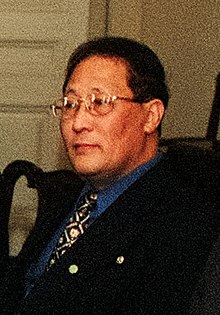Kang Sok-ju
| Korean spelling | |
|---|---|
| Chosŏn'gŭl | 강석주 |
| Hancha | 姜 錫 柱 |
|
Revised Romanization |
Gang Seok-ju |
|
McCune- Reischauer |
Kang Sŏkchu |
Kang Sok-ju (born August 29, 1939 in the district of P'yŏngwŏn-gun, P'yŏngan-namdo ; † May 20, 2016 ) was a North Korean politician .
Life
Kang Sok-ju studied French at the Pyongyang University of International Relations . He also attended a university in the People's Republic of China for several years . He began his diplomatic career in the foreign affairs department of the Central Committee of the Labor Party of Korea . He was already working here with the future Foreign Minister Kim Yong-nam .
In March 1984, Kang followed his former boss, Kim Yong-nam, to the Ministry of Foreign Affairs and became one of the minister's deputies. From June 1986 he was the first deputy foreign minister. In November of the same year he was elected to the Supreme People's Assembly, of which he was a deputy until his death. Since December 1991, Kang was a member of the Central Committee of the Labor Party of Korea . In July 1994, after the death of the head of state Kim Il-sung, he was involved in organizing the funeral services. After the death of the long-standing North Korean chief diplomat Paek Nam-sun in early January 2007, he held the post of foreign minister for a few months until Pak Ui-chun was appointed foreign minister in May 2007 .
Kang Sok-ju made his first appearance on the international stage in 1990 during talks between North Korea and the USA about the North Korean nuclear program. He has since been considered the State Department's expert on relations with the United States. In 1991 he gave a speech to the UN General Assembly on the occasion of the admission of both Korean states to the United Nations . In 1993 he took part in the talks between North Korea and the USA and was also present when former US President Jimmy Carter visited Pyongyang in 1994 . As a representative of North Korea, he signed the Geneva Framework Agreement between his country and the USA on nuclear weapons in October 1994 .
In 1999, Kang received former US Secretary of Defense William Perry in Pyongyang for talks. He also held talks with other US politicians in Pyongyang, for example with Congressmen Bill Richardson and Tony Hall, and with the former US ambassador in Seoul , James Laney . In 2000, Kang traveled to Washington with the North Korean special envoy, Jo Myong-rok, for a working meeting with the aim of improving bilateral relations . In 2001 he accompanied the then head of state Kim Jong-il on his state visit to Moscow . Kang was considered a close collaborator of Kim Jong-il. In recent years he has also played a key role in the six-party talks , the negotiations on North Korea's nuclear weapons program.
Because Kang had made decisions without consulting the state and party leadership, he was sentenced to imprisonment in a re-education camp in the early 1990s . He died of esophageal cancer in May 2016 .
Kang's brother runs a Labor History Research Center.
Individual evidence
- ↑ Kim Tong-Hyung: North Korean diplomat who negotiated '94 deal with US dies . AP announcement on USA Today , May 20, 2016.
Web links
- Profile on the website of the South Korean Broadcasting Corporation ( KBS )
- Short biography ( memento from September 29, 2008 in the Internet Archive ) (Chinese)
- Veteran diplomat Kang Sok-ju is Kim's key aide (English)
- Search for Kang Jok-su in the reports of the state-run North Korean news agency KCNA (English)
| personal data | |
|---|---|
| SURNAME | Kang, Sok-ju |
| ALTERNATIVE NAMES | 강석주 (Hangeul); 姜 錫 柱 (Hanja); Gang, Seok-ju (revised Romanization); Kang, Sŏkchu (McCune-Reischauer) |
| BRIEF DESCRIPTION | North Korean politician |
| DATE OF BIRTH | August 29, 1939 |
| PLACE OF BIRTH | P'yŏngwŏn-gun County, P'yŏngan-namdo Province |
| DATE OF DEATH | May 20, 2016 |
